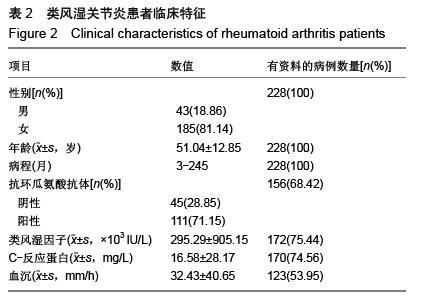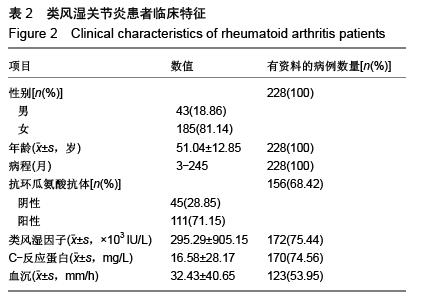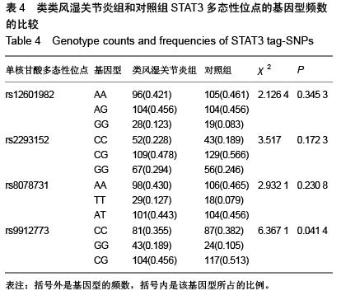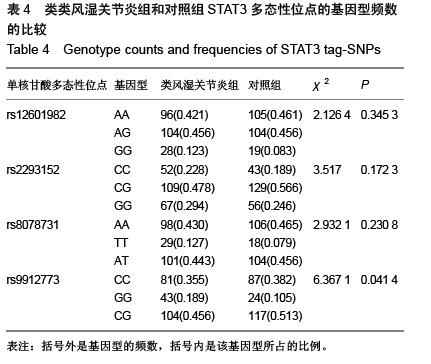| [1] McInnes IB, Schett G. The pathogenesis of rheumatoid arthritis. N Engl J Med. 2011;365(23):2205-2219.
[2] Müller-Ladner U, Gay RE, Gay S. Molecular biology of cartilage and bone destruction. Curr Opin Rheumatol. 1998;10(3):212-219.
[3] Jutley G, Raza K, Buckley CD. New pathogenic insights into rheumatoid arthritis. Curr Opin Rheumatol. 2015;27(3): 249-255.
[4] Mohan VK, Ganesan N, Gopalakrishnan R. Association of susceptible genetic markers and autoantibodies in rheumatoid arthritis. J Genet. 2014;93(2):597-605.
[5] Arias MV, Domingues EV, Lozano RB, et al. Study of class I and II HLA alleles in 30 ecuadorian patients with rheumatoid arthritis compared with alleles from healthy and affected subjects with other rheumatic diseases. Rev Bras Reumatol. 2010;50(4):423-433.
[6] Furukawa H, Oka S, Shimada K, et al. Human leukocyte antigen polymorphisms and personalized medicine for rheumatoid arthritis. J Hum Genet. 2015;60(11):691-696.
[7] Okamoto K, Makino S, Yoshikawa Y, et al. Identification of I kappa BL as the second major histocompatibility complex-linked susceptibility locus for rheumatoid arthritis. Am J Hum Genet. 2003;72(2):303-312.
[8] Newton JL, Harney SM, Wordsworth BP, et al. A review of the MHC genetics of rheumatoid arthritis. Genes Immun. 2004; 5(3):151-157.
[9] Besenyei T, Kadar A, Tryniszewska B, et al. Non-MHC risk alleles in rheumatoid arthritis and in the syntenic chromosome regions of corresponding animal models. Clin Dev Immunol. 2012;2012:284751.
[10] Stahl EA, Raychaudhuri S, Remmers EF, et al. Genome-wide association study meta-analysis identifies seven new rheumatoid arthritis risk loci. Nat Genet. 2010;42(6):508-514.
[11] Brenner M, Laragione T, Yarlett NC, et al. Cia27 is a novel non-MHC arthritis severity locus on rat chromosome 10 syntenic to the rheumatoid arthritis 17q22-q25 locus. Genes Immun. 2006;7(5):335-341.
[12] Epp Boschmann S, Goeldner I, Tuon FF, et al. Mannose-binding lectin polymorphisms and rheumatoid arthritis: A short review and meta-analysis. Mol Immunol. 2016;69:77-85.
[13] Stahl EA, Wegmann D, Trynka G, et al. Bayesian inference analyses of the polygenic architecture of rheumatoid arthritis. Nat Genet. 2012;44(5):483-489.
[14] Liang J, Nagahashi M, Kim EY, et al. Sphingosine-1-phosphate links persistent STAT3 activation, chronic intestinal inflammation, and development of colitis-associated cancer. Cancer Cell. 2013; 23(1):107-120.
[15] Bianco AM, Girardelli M, Tommasini A. Genetics of inflammatory bowel disease from multifactorial to monogenic forms. World J Gastroenterol. 2015;21(43):12296-12310.
[16] Sato K, Shiota M, Fukuda S, et al. Strong evidence of a combination polymorphism of the tyrosine kinase 2 gene and the signal transducer and activator of transcription 3 gene as a DNA-based biomarker for susceptibility to Crohn's disease in the Japanese population. J Clin Immunol. 2009;29(6): 815-825.
[17] Willson TA, Kuhn BR, Jurickova I, et al. STAT3 genotypic variation and cellular STAT3 activation and colon leukocyte recruitment in pediatric Crohn disease. J Pediatr Gastroenterol Nutr. 2012;55(1):32-43.
[18] Wang Z, Xu B, Zhang H, et al. Association between STAT3 gene polymorphisms and Crohn's disease susceptibility: a case-control study in a Chinese Han population. Diagn Pathol. 2014;9:104.
[19] Danoy P, Pryce K, Hadler J, et al. Association of variants at 1q32 and STAT3 with ankylosing spondylitis suggests genetic overlap with Crohn's disease. PLoS Genet. 2010;6(12):e1001195.
[20] Barrett JC, Hansoul S, Nicolae DL, et al. Genome-wide association defines more than 30 distinct susceptibility loci for Crohn's disease. Nat Genet. 2008;40(8):955-962.
[21] Zhang J, Wu J, Peng X, et al. Associations between STAT3 rs744166 polymorphisms and susceptibility to ulcerative colitis and Crohn's disease: a meta-analysis. PLoS One. 2014;9(10):e109625.
[22] Wang L, Wang ZT, Zhang HX, et al. Association between STAT3 gene polymorphisms and ulcerative colitis susceptibility: a case-control study in the Chinese Han population. Genet Mol Res. 2014;13(2):2343-2348.
[23] Franke A, Balschun T, Karlsen TH, et al. Replication of signals from recent studies of Crohn's disease identifies previously unknown disease loci for ulcerative colitis. Nat Genet. 2008; 40(6):713-715.
[24] Davidson SI, Liu Y, Danoy PA, et al. Association of STAT3 and TNFRSF1A with ankylosing spondylitis in Han Chinese. Ann Rheum Dis. 2011;70(2):289-292.
[25] Okada Y, Wu D, Trynka G, et al. Genetics of rheumatoid arthritis contributes to biology and drug discovery. Nature. 2014;506(7488):376-381.
[26] Kim K, Bang SY, Lee HS, et al. High-density genotyping of immune loci in Koreans and Europeans identifies eight new rheumatoid arthritis risk loci. Ann Rheum Dis. 2015;74(3):e13.
[27] Okada Y, Terao C, Ikari K, et al. Meta-analysis identifies nine new loci associated with rheumatoid arthritis in the Japanese population. Nat Genet. 2012;44(5):511-516.
[28] Arnett FC, Edworthy SM, Bloch DA, et al. The American Rheumatism Association 1987 revised criteria for the classification of rheumatoid arthritis. Arthritis Rheum. 1988; 31(3):315-324.
[29] Aletaha D, Neogi T, Silman AJ, et al. 2010 Rheumatoid arthritis classification criteria: an American College of Rheumatology/European League Against Rheumatism collaborative initiative. Arthritis Rheum. 2010;62(9):2569-2581.
[30] Cheon H, Yang J, Stark GR. The functions of signal transducers and activators of transcriptions 1 and 3 as cytokine-inducible proteins. J Interferon Cytokine Res. 2011; 31(1):33-40.
[31] Kolosenko I, Grander D, Tamm KP. IL-6 activated JAK/STAT3 pathway and sensitivity to Hsp90 inhibitors in multiple myeloma. Curr Med Chem. 2014;21(26):3042-3047.
[32] Wang SW, Sun YM. The IL-6/JAK/STAT3 pathway: potential therapeutic strategies in treating colorectal cancer (Review). Int J Oncol. 2014;44(4):1032-1040.
[33] Timofeeva OA, Chasovskikh S, Lonskaya I, et al. Mechanisms of unphosphorylated STAT3 transcription factor binding to DNA. J Biol Chem. 2012;287(17):14192-14200.
[34] Weber-Nordt RM, Riley JK, Greenlund AC, et al. Stat3 recruitment by two distinct ligand-induced, tyrosine- phosphorylated docking sites in the interleukin-10 receptor intracellular domain. J Biol Chem. 1996;271(44):27954-27961.
[35] Firestein GS, Zvaifler NJ. How important are T cells in chronic rheumatoid synovitis?: II. T cell-independent mechanisms from beginning to end. Arthritis Rheum. 2002;46(2):298-308.
[36] Ortiz MA, Diaz-Torné C, Hernández MV, et al. IL-6 blockade reverses the abnormal STAT activation of peripheral blood leukocytes from rheumatoid arthritis patients. Clin Immunol. 2015;158(2):174-182.
[37] Jones GW, Greenhill CJ, Williams JO, et al. Exacerbated inflammatory arthritis in response to hyperactive gp130 signalling is independent of IL-17A. Ann Rheum Dis. 2013; 72(10):1738-1742.
[38] Wang F, Sengupta TK, Zhong Z, et al. Regulation of the balance of cytokine production and the signal transducer and activator of transcription (STAT) transcription factor activity by cytokines and inflammatory synovial fluids. J Exp Med. 1995; 182(6):1825-1831.
[39] Camporeale A, Poli V. IL-6, IL-17 and STAT3: a holy trinity in auto-immunity? Front Biosci (Landmark Ed). 2012;17:2306- 2326.
[40] Ernst M, Thiem S, Nguyen PM, et al. Epithelial gp130/Stat3 functions: an intestinal signaling node in health and disease. Semin Immunol. 2014;26(1):29-37.
[41] Polgar N, Csongei V, Szabo M, et al. Investigation of JAK2, STAT3 and CCR6 polymorphisms and their gene-gene interactions in inflammatory bowel disease. Int J Immunogenet. 2012;39(3):247-252.
[42] Lubberts E. The IL-23-IL-17 axis in inflammatory arthritis. Nat Rev Rheumatol. 2015;11(10):562.
[43] Lubberts E. The IL-23-IL-17 axis in inflammatory arthritis. Nat Rev Rheumatol. 2015;11(7):415-429.
[44] Kuuliala K, Kuuliala A, Koivuniemi R, et al. Constitutive STAT3 Phosphorylation in Circulating CD4+ T Lymphocytes Associates with Disease Activity and Treatment Response in Recent-Onset Rheumatoid Arthritis. PLoS One. 2015;10(9): e0137385.
[45] Ye H, Zhang J, Wang J, et al. CD4 T-cell transcriptome analysis reveals aberrant regulation of STAT3 and Wnt signaling pathways in rheumatoid arthritis: evidence from a case-control study. Arthritis Res Ther. 2015;17:76.
[46] Lee SY, Yoon BY, Kim JI, et al. Interleukin-17 increases the expression of Toll-like receptor 3 via the STAT3 pathway in rheumatoid arthritis fibroblast-like synoviocytes. Immunology. 2014;141(3):353-361.
[47] Krause A, Scaletta N, Ji JD, et al. Rheumatoid arthritis synoviocyte survival is dependent on Stat3. J Immunol. 2002;169(11):6610-6616.
[48] Raychaudhuri S, Remmers EF, Lee AT, et al. Common variants at CD40 and other loci confer risk of rheumatoid arthritis. Nat Genet. 2008;40(10):1216-1223.
[49] Kochi Y, Okada Y, Suzuki A, et al. A regulatory variant in CCR6 is associated with rheumatoid arthritis susceptibility. Nat Genet. 2010;42(6):515-519.
[50] Felson DT, Klareskog L. The genetics of rheumatoid arthritis: new insights and implications. JAMA. 2015;313(16): 1623-1624.
[51] Jacob N, Jacob CO. Genetics of rheumatoid arthritis: an impressionist perspective. Rheum Dis Clin North Am. 2012; 38(2):243-257.
[52] Jirholt J, Lindqvist AB, Holmdahl R. The genetics of rheumatoid arthritis and the need for animal models to find and understand the underlying genes. Arthritis Res. 2001;3(2):87-97.
[53] Yarwood A, Huizinga TW, Worthington J. The genetics of rheumatoid arthritis: risk and protection in different stages of the evolution of RA. Rheumatology (Oxford). 2014. in press.
[54] Yamamoto K, Okada Y, Suzuki A, et al. Genetics of rheumatoid arthritis in Asia--present and future. Nat Rev Rheumatol. 2015;11(6):375-379.
|









